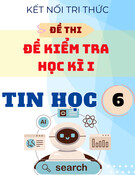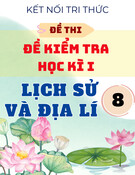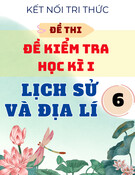
Trang 1/8 - https://thi247.com/
TRƯỜNG THPT QUẾ VÕ SỐ 1
(Đề gồm có 08 trang)
ĐỀ THI CHỌN ĐỘI TUYỂN HỌC SINH GIỎI
NĂM HỌC 2020 - 2021
Môn: Tiếng Anh. Khối: 12
Thời gian làm bài: 90 phút (Không kể thời gian phát đề)
TRƯ
Họ và tên: ……………………………………….......... SBD: …………………...................
Thí sinh không được sử dụng tài liệu. Cán bộ coi thi không giải thích gì thêm.
-----------------------------------------------------------------------
SECTION A. LISTENING
Part 1: You will hear two people speaking about their fondness for trains. For questions 1-5,
choose the correct answer (A, B, C or D) which fits best according to what you hear.
1) What point does Philip make about the people who are involved in the locomotive side of
trains?
A) Some avoid doing it because its too dirty. B) Some worry about the dangers involved.
C) Some find it to be an instinctive activity. D) Some only do it for the financial rewards it
brings.
2) When Mike discusses why he enjoys the world of trains, what contrast does he identify
between the different groups of people he interacts with?
A) A difference in social status. B) A difference in ages.
C) A difference in technical ability. D) A difference in motivation.
3) What view is stated by Mike about how the railway has helped him in his role as a parent?
A) It has helped him develop a closer relationship
with his daughter.
B) It has taught him patience.
C) It has helped him focus on his daughters
career possibilities.
D) It has given him stability in his life.
4) When discussing different aspects of the railway, both speakers agree that ___________.
A) Age does not need to be a handicap. B) Both men and women are equally welcome.
C) It can be quite demanding. D) Cleanliness is not the first adjective that
springs to mind.
5) What final conclusion do both speakers reach about volunteering on the railway?
A) The time they have spent has been
difficult but worth it.
B) They have both learnt a lot.
C) They are better people for having been
involved with it.
D) It has helped them grow while at the same time
giving them a direction for the future.
Part 2: Listen to the audio and choose the best answer to each question.
1. What does the lecturer provide for those who are interested in doing extra reading?
A. Personal consultation sessions.
B. Extra materials, such as a booklist.
C. Mid-term examination.
D. Free glasses.
2. In the past, time management meant you needed to
A. reduce your stress.
B. plan for every hour of the week.
C. own a good watch.
D. set goals and try to achieve these goals.

Trang 2/8 - https://thi247.com/
3. Today, wise time management means you need to
A. set goals and work in a systematic way.
B. work faster.
C. set an overview of your assignment.
D. make a list, plan for everything and try to stick to this plan.
4. In this college, students are assigned ____________ at the end of each semester.
A. team projects.
B. final term examinations.
C. essays.
D. time management courses.
5. One sign he lecturer mentions that students feel under pressure is
A. library books go missing.
B. students get angry for no reason.
C. lower class attendance rates.
D. trouble at the library.
6. What kind of suggestion does the lecturer give to the students?
A. Making a very detailed plan of their daily activities.
B. Not being so stressed just because there is an assignment.
C. A regular one-hour session in their personal timetables.
D. Wearing comfortable shoes.
7. According to the lecturer, there are three kinds of planners. They are:
A. one weekly planner, one daily planner and one hour planner.
B. one yearly planner, one weekly planner and one daily planner.
C. one term planner, one monthly planner and one weekly planner.
D. one term planner, one weekly and one daily planner.
8. If you want to set an overview of your time, you should need at least
A. one week
B. half a week.
C. one month.
D. one term.
9. The daily planner of time is mainly concerned with
A. the detailed planning.
B. how to plan all available time.
C. TV schedules.
D. an overview of everything you need to do for several days.
10. According to the lecturer, wise time management may have the following benefit:
A. having more time to spend on relaxation and other activities.
B. improving your performance in the final term assignment.
C. helping you write better essays.
D. improving your memory.
SECTION B. LEXICO-GRAMMAR
Mark the letter A, B, C or D to indicate the word whose underlined part differs from the other
three in pronunciation in each of the following questions.
Question 1: A. coverage B. beverage C. rouge D. gauge

Trang 3/8 - https://thi247.com/
Question 2: A. prepare B. preface C. preparation D. prejudice
Mark the letter A, B, C, or D to indicate the word that differs from the other three in the
position of primary stress in each of the following questions.
Question 3: A. fulltime B. farmhand C. bookshop D. tradesman
Question 4: A. interchange B. infamous C. contributory D. undercurrent
Mark the letter A, B, C, or D sheet to indicate the correct answer to each of the following
questions.
Question 5. __________ comes a time when you have to make a decision and stick to it.
A. It B. That C. Then D. There
Question 6. More and more trees in this area are found __________ from the effect of pollution.
A. died B. to be dead C. to be dying D. having died
Question 7. I don’t need any medicine. I’m as right as _______________.
A. rain B. clouds C. rays D. a haze
Question 8. Kathy __________ comes up with a solution when everyone else is at a loss.
A. absolutely B. invariably C. persistently D. universally
Question 9. I’d say let’s meet on Saturday but I’m none __________ sure what’s happening at the
weekend.
A. so B. very C. that D. too
Question 10. Every Christmas of my childhood was the same. My father __________ late for lunch,
weighed down with presents for the family.
A. would arrive B. could arrive C. was arriving D. got used to arriving
Question 11. The mayor failed to deliver key promises in his manifesto, but to give him his
improve the city's infrastructure.
A. account B. view C. owing D.due
Question 12. He was extremely protective _____________ his role as advisor.
A. of B. with C. about D. for
Question 13. “It’s really cold today”
“Yes, I didn’t want to get out of bed, _____________ go outside.”
A. even though B. much less C. aside from D. not only
Question 14. “Is John a good student?” “He is, _____________, an excellent student.”
A.in most parts B. for most parts
C. for the most part D. in most of the parts
Question 15. Our plan is completely _____________. Nothing can possibly go wrong.
A. foolproof B. airtight C. foolhardy D. waterproof
Question 16.
He spent ten years in the army and for most of the time he was abroad.
A. Camped B. situated C. placed D. stationed
Question 17. Hardly had the van turned the corner when one of the back wheels
A. Broke away B. turned round C. came off D. rolled down
Question 18. I’d rather you ______________a noise last night, I couldn’t get to sleep.
A. Hadn’t made B. wouldn’t make C. didn’t make D. haven’t made
Question 19. If we have to pay a £1,000 fine, then ________. We’re not going to win a fight with the Tax
Office.
A. so be it B. be it so C. thus be it D. be it thus
Question 20. He came into the room and sat down without _________ a word to anyone.

Trang 4/8 - https://thi247.com/
A. as far as B. too much of C. very much of D. so much as
Question 21. We’re going to visit the Great Walls. Everybody says this is __________.
A. a too good chance for being lost B. too good a chance to be lost
C. too good a chance for being lost D. a too good chance to lose
Read the following passage and mark the letter A, B, C, or D to indicate the correct answer to
each of the question.
Archaeology has long been an accepted tool for studying prehistoric cultures. Relatively recently the
same techniques have been systematically applied to studies of the more immediate past. This has
been called "historical archaeology", a term that is used in the United States to refer to any
archaeological investigation into North American sites that postdate the arrival of Europeans.
Back in the 1930's and 1940's, when building restoration was popular, historical archaeology was
primarily a tool of architectural reconstruction. The role of archaeologists was to find the
foundations of historic buildings and then take a back seat to architects.
The mania for reconstruction had largely subsided by the 1950's and 1960's. Most people entering
historical archaeology during this period came out of university anthropology departments where
they had studied prehistoric cultures. They were, by training, social scientists, not historians, and
their work tended to reflect this bias. The questions they framed and the techniques they used were
designed to help them understand, as scientists, how people behaved. But because they were
treading on historical ground for which there was often extensive written documentation and
because their own knowledge of these periods was usually limited, their contributions to American
history remained circumscribed. Their reports, highly technical and sometimes poorly written, went
unread.
More recently, professional archaeologists have taken over. These researchers have sought to
demonstrate that their work can be a valuable tool not only of science but also of history, providing
fresh insights into the daily lives of ordinary people whose existences might nt otherwise be so well
documented. This newer emphasis on archaeology as social history has shown great promise, and
indeed work done in this area has led to a reinterpretation of the United States' past.
In Kingston, New York, for example, evidence has been uncovered that indicates that English goods
were being smuggled into that city at a time when the Dutch supposedly controlled trading in the
area. And in Sacramento an excavation at the site of a fashionable nineteenth-century hotel revealed
that garbage had been stashed in the building' s basement despite sanitation laws to the contrary.
Question 22: What is the main topic of the passage?
A.How the purpose and the methods of historical archaeology have changed.
B.How archaeology has been applied to studies of prehistoric cultures.
C.The attitude professional archaeologists hold toward historical archaeology.
D.The contributions social scientists make to historical archaeology.
Question 23: According to the passage, what is a relatively new focus in archaeology?
A.studying prehistoric cultures
B.investigating ancient sites in what is now the United States
C.comparing the culture of North America to that of Europe
D.studying the recent past
Question 24: According to the passage, when had historical archaeologists been trained as
anthropologists?

Trang 5/8 - https://thi247.com/
A.before the 1930's B.during the 1930's and 1940's
C.during the 1950's and 1960's' D.after the 1960's
Question 25: In the third paragraph, the author implies that the questions and techniques of history
and those of social science are ______.
A.of equal value in studying prehistoric cultures
B.quite different from each other
C.all aiming to understand people's behaviour
D.all highly technical and poorly written
Question 26: The equivalent of the word "supposedly" in the last paragraph is ______.
A.rigidly B.barely C.seemingly D.ruthlessly
Read the following passage and mark the letter A, B, C, or D to indicate the correct word or
phrase that best fits each of the numbered blanks.
In the US, industries that generate hazardous wastes want to dispose of them as cheaply as possible.
Private companies hired to dispose of this waste compete with each other to offer the lowest prices
to these industries. The government does not get involved, beyond
setting minimum safety standards.
Unfortunately, the (27) _______ of companies that generate and dispose of waste is to save money, not
to guarantee safety. These companies usually send waste to landfills because this is cheaper than
recycling or incineration. Disposal firms who want to increase their business must cut corners to
lower costs and (28) ________ customers. At the same time, relatively little is done to reduce the
volume of waste generated,because disposal cost (29) __________relatively modest.
Things are different in Denmark. There the government participates in the waste disposal process
beginning (30) ____________ the front end. Together with industry, the government formed a
corporation to establish and operate waste disposal facilities. This company, called Kommunichem,
has a (31) ____________ on waste disposal. Generators of hazardous waste must ship their waste to one
of Kommunichem’s disposal facilities. In this system,there is no price competition in the waste
disposal business.
Question 27 A. solution B. license C. importance D. goal
Question 28: A. survive B. efficient C. gain D. prosper
Question 29: A. still B. have C. remain D. cheap
Question 30: A. to B. by C. of D. at
Question 31: A. power B. responsibility C. monopoly D. profit
Read the following passage and mark the letter A, B, C, or D to indicate the correct answer to
each of the question.
The spectacular aurora light displays that appear in Earth’s atmosphere around the north and south
magnetic poles were once mysterious phenomena. Now, scientists have data from satellites and
ground-based observations from which we know that the aurora brilliance is an immense electrical
discharge similar to that occurring in a neon sign.
To understand the cause of auroras, first picture the Earth enclosed by its magnetosphere, a
huge region created by the Earth’s magnetic field. Outside the magnetosphere, blasting toward the
Earth is the solar wind, a swiftly moving plasma of ionized gases with its own magnetic field.



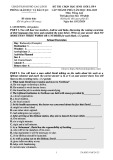
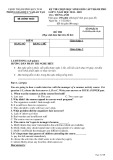
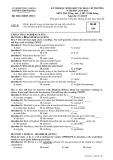
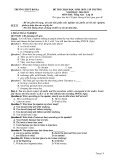
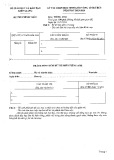
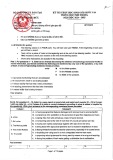
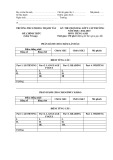





![Đề tham khảo ôn tập học kì 1 môn Toán lớp 6 năm 2025-2026 - Trường Trung học Thực hành Sài Gòn [Mới nhất]](https://cdn.tailieu.vn/images/document/thumbnail/2025/20251206/tnkhanh@sgu.edu.vn/135x160/64331765161604.jpg)



